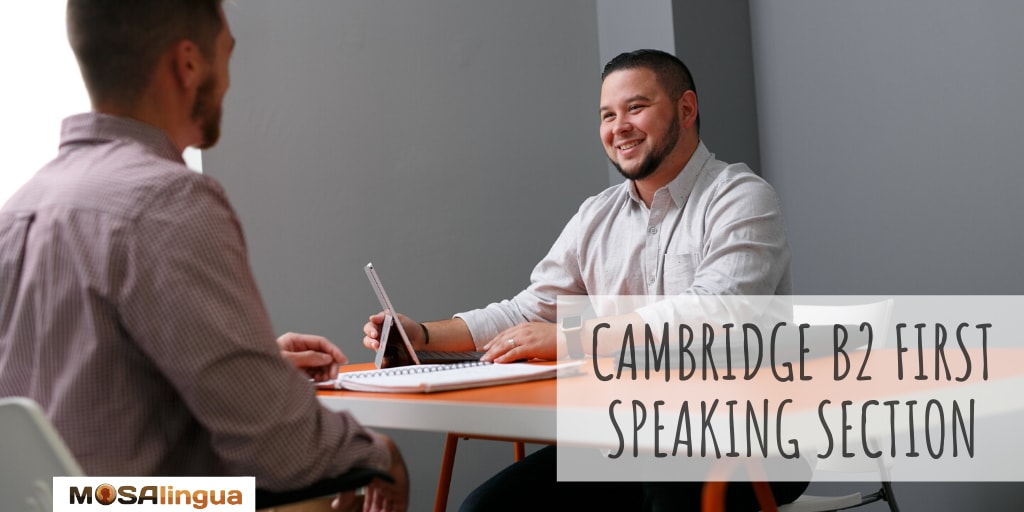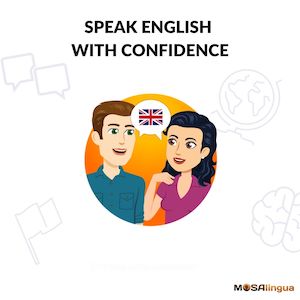Next up in our series of articles on the Cambridge B2 First Certificate is the speaking section. We’ve already shared general information about the exam and techniques for passing the writing section, and we’ll be releasing our article about the reading and listening sections soon! Today, learn about the structure of the speaking section, the different skills that you have to demonstrate, and how to best prepare yourself for the exam.

What Is the Cambridge B2 First Certificate Speaking Section Like?
If you want to take the Cambridge B2 First Certificate exam, the first thing you should do is check out the general info about the B2 First Certificate. The test has 4 separate parts: reading, writing, listening, and speaking.
The Cambridge B2 First speaking section requires you to use spoken English to communicate about various topics, by yourself, with the examiner, and with another candidate. The speaking exam is short, but it’s still worth 20% of your total score, so it’s important!
Here are the most important things you need to know:
- Time allowed: 14 minutes (total for 2 test-takers)
- Number of parts: 4 parts
- Interview (2 minutes per test-taker)
- Commentary (1 minute per test-taker)
- Conversation (3 minutes)
- Discussion (4 minutes)
- Percentage of total score: 20%
- Purpose: To evaluate your ability to effectively communicate out loud. During the test, you will have to speak by yourself for some tasks. But for others, you’ll also have to interact with the examiner and with another test candidate. That means that even though the main skills you’ll be tested on are speech production focused, there’s a listening component, too.
We’ll break down each of the four tasks in a minute, but first let’s talk about general speaking prep.
Tips to Help You Pass the Speaking Section of the B2 First Certificate
Since the Cambridge exams are well known, there are many resources that can help you to prepare for them.
B2 First speaking section-specific prep
The main source for you will be Cambridge’s web pages with specifics about the exam. But here are a few more ways to improve your general speaking skills in preparation for the test:
- How to Pass the Cambridge B2 First Certificate – general information about the B2 First Certificate
- Cambridge’s sample papers – Cambridge’s information section has practice exams that you can download
If you want to pass the B2 First speaking section, you must prepare yourself to articulately express your ideas. The “STAR” technique is a good way to train. This technique will help you organize your thoughts during each of the different tasks (and in real-life situations, like job interviews!).
STAR is an acronym, which stands for:
S – situation: What is the context?
T – task: What tasks/activities did/will you do?
A – action: How did/will you carry out the activity/action?
R – result: What was/will be the final result?
General speaking prep
It’s important to get in as much speaking practice as possible before you take the test. Even if the things you practice aren’t specifically what you will be tested on, it can’t hurt!
- Resources for English Learners – a super list of resources that can help you improve your English (there’s a whole section on speaking tools)
- Speak English with Confidence MasterClass – a 10-unit course that tackles every aspect of speaking English: from sounds that are specific to the English language, to confidence boosters, practice techniques, and conversation starters (plus 5 awesome bonuses!)
- How to Overcome the Obstacles that Are Preventing You from Speaking English – a video about some of the most common obstacles that language learners face when it comes to speaking. And of course, tips for facing and overcoming them!
How to Pass the Speaking Section of the B2 First Exam
Like we said before, two people are tested at a time. In some parts you’ll speak only to the proctor, and in others you’ll need to interact with the other candidate. Don’t worry, you won’t be graded as a pair; your score is totally separate from your partner’s. The following skills will be put to the test during the exam. You should try to master each one of them.
Part 1 (Interview)
- Task: Provide information about yourself
- Purpose: To express preferences, provide information.
- Time: 2 minutes per candidate
In the first part of the 15-minute exam, the interviewer will ask each candidate a few personal questions – but not too personal! Be prepared to talk about things like your career/education, your family/friends, your hobbies/interests, your habits/daily life, things you like and dislike.
Part 2 (Individual session)
- Task: Talk about photographs
- Purpose: To compare and contrast, analyze and describe, and express opinions (summarize).
- Time: 1 minute per candidate
You’ll have one minute to talk about your own photograph or set or photographs, and then 30 seconds to comment on your partner’s photographs based on a follow-up question from the examiner. Don’t interrupt your partner, and try to fill the entire time you are given. If possible, try not to spend too long simply describing the pictures. It’s better to compare and contrast when you can. Feel free to talk about your personal opinions, too!
Part 3 (Teamwork)
- Task: Discuss possibilities and come to an agreement as a team
- Purpose: To suggest (contrast), defend opinions, explain (correct errors), speculate (analyze), make decisions (negotiate), evaluate (summarize/quantify effects of possible solution).
- Time: 2 minutes to talk about the topics you are given, and 1 minute to agree on a solution
The two of you will have a task to complete together. Give your partner time to speak, and take their suggestions seriously. Be respectful, even if you disagree with what they think! Be sure to listen and respond, like a tennis match, instead of having two separate conversations, like a game of bowling in two separate lanes.
Part 4 (Discussion)
- Task: Have a discussion with the other candidate
- Purpose: To defend opinions (narrate), and to agree or disagree with someone (express a preference).
- Time: 4 minutes per candidate
You’re nearly there! In this last part, you’ll have another discussion with your partner. Again, be polite, and be sure to justify the answers and give examples!
How is the B2 First Speaking Section Scored?
You’ll be evaluated in these categories: Grammar and Vocabulary; Discourse Management; Pronunciation; and Interactive Communication. The examiner will rate you on a scale of 0-5 for each of them. It’s a good idea to record yourself when you practice. As you listen back to the recording, think about how the examiner would grade your answers.
Grade yourself before test day
In the Grammar and Vocabulary category, pay attention to things like:
- Am I using several different grammatical structures (and using them correctly)?
- Am I using a wide range of vocabulary (not just the same simple words over and over)?
In the Discourse Management category, mostly evaluated during Part 2, ask yourself:
- Is my speech fluent (or do I pause often to gather my thoughts)?
- Am I speaking in full sentences (or in short fragments/one-word answers)?
- Are my ideas organized in a way that makes sense (or do I repeat myself or forget to connect my thoughts)?
Be extra aware of your Pronunciation throughout the entire exam:
- Is my intonation and stress in the right place (for example, does my voice go up in pitch at the end of questions)?
- Am I speaking clearly (or am I mumbling because I’m nervous or lack confidence)?
And finally, in the Interactive Communication category, mostly evaluated in Part 3, think about:
- Am I asking and answering questions appropriately (or is the discussion one-sided)?
- Am I making an effort to work as a team with my partner (or is one person dominating the conversation)?
Be ambitious!
Here is a tip from the examiner’s assessment guide:
“Candidates are marked on the language that they “use” and “attempt to use” to convey their message.” – This means that even if you try a complex structure and don’t get it quite right, you’ll be rewarded for trying (as long as they can still understand what you meant). They encourage test-takers to be ambitious! Basically, without going off topic, you should show what you know!
More practice
In addition to the official exam website and practice test, here are some videos of past test takers taking the speaking section of the B2 First exam. I really recommend watching them and practicing answering the questions you hear! They can also help you decide if the B2 First exam is the right level for you. You can even read comments from the examiners:
Check our the Cambridge English YouTube channel for more videos about the B2 First test.
I hope these techniques will be of help when preparing and on the day of the B2 First Certificate speaking section. The official exam website has more info and practice tests, so that would be a good place to go next. For other tips and tricks to get the most of your language learning, follow us on Facebook and Instagram! And if you have any tricks of your own for exam-takers, let us know in the comments section.
Related posts:
Improve your spoken English

Good news: we have a course for that: the Speak English with Confidence MasterClass.
It’s a comprehensive 10-module course designed to help you improve every aspect of your spoken English – fluency, confidence, pronunciation, and more – step by step, and enjoy doing it.






Comments